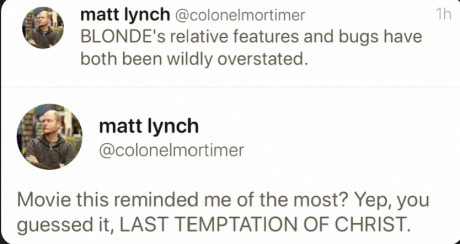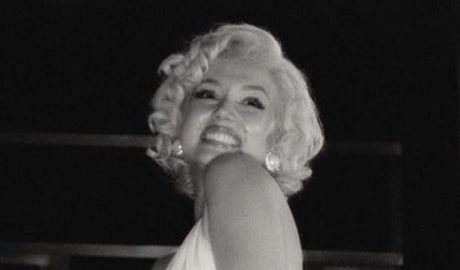HE to Blonde spoiler whiners: This post discusses the August 1962 death of Marilyn Monroe, which is what Andrew Dominik‘s Blonde (Netflix streaming, 9.28.22) ends with.
HE to friendo #1: “Yesterday I slogged my way through Andrew Dominik‘s Blonde, which I regard as artful torture porn. And then I happened upon a Matt Lynch tweet that analogized Blonde and a landmark 1988 film, and the instant I read it I said ‘yes!'”

“I’m thinking not just of the incessant dismissals and degradations and spiritual uncertainties, but the anguished and agonized relationship between the main protagonist and the elusive ‘father.’
“Just as Willem Dafoe sips a goblet of sacramental wine before submitting to his final fate, Norma Jean swallows alcohol and barbiturates before her final episode of passion at her Fifth Helena Drive abode (the delivery man, the fuzzy tiger, the shattering note). And like Dafoe’s Jesus, a spectral Marilyn smiles and separates from death, and greets the immortality that she still enjoys today a la Andrew Dominik.”
Friendo #1 to HE: “That’s a brilliant interpretation. Celebrity is in its own way like religion. It still is. The fandoms online are like churches. Which says more about us than it does Marilyn. Lynch is saying we treat her like a kind of deity. Very smart. The myth is the truth.”
Friendo #2 to HE: “Well, there’s no doubt that she was a supreme martyr of 20th-century feminine glory and trauma. But the Jesus comparison feels a little abstract to me. What I think you’re possibly leaving out is that Blonde, dark as it is, is not torture porn. It’s a movie that’s trying to capture who Marilyn Monroe really was.”
HE to Friendo #2: “I really do think it’s primarily torture porn of an artful nature. Yes, it does capture who Monroe really was, but at what a price! Yes, it’s about the MYTH, or precisely THE TRAGIC but TRANSCENDENT MYTH. Marilyn suffered for our sins, but she’s lived eternally ever since and, in an underlined and undeniable sense, more splendidly and blessedly over the last 60 years than she did in her own biological life span, which lasted only a mere 36 years.


“The last thing Marilyn does, after dying, is become a happy ghost…she separates from her body as she smiles delightedly at the camera. As if to say, ‘The torment is finally over, and now the eternally blessed myth takes over, and I will revel in the glory of that myth for ever and ever.’” Or, if you will, “It is accomplished.”
Friendo #2 to HE: “That’s what I liked about Blonde. It’s probably the best account of what was truly occurring inside Monroe’s mind. Other depictions have failed in trying to convey the inner torture she was feeling.”
HE to Friendo #2: “Oh, it was torture, all right!”
Friendo #2 to HE: “I think it’s torture psychodrama. That’s what’s fascinating about it. She’s one of the most important artists of the 20th century, and I found the spectacle of what was happening inside her quite gripping. The cornerstone of her trauma, remember, isn’t all the men who exploited or didn’t understand her. It was her insanely abusive upbringing. It’s boring to say but that, in a nutshell, is why she was so fucked up.”
HE to Friendo #2: “Agreed. The mother and the father were demonic.”
Friendo #2 to HE: “Not just because the Hollywood system was patriarchal and exploitative and oppressive. But because the Hollywood system crumpled this already broken person.”
HE to Friendo #2: “After meeting and hanging with Montgomery Clift, Monroe told a friend ‘I’ve just met someone who might be as fucked up as I am, and maybe more so.'”
Friendo #2 to HE: “I don’t see how all of that, portrayed truthfully and with a fair degree of artfulness (although there are a number of things in the film I didn’t care for), adds up to ‘torture porn.'”
HE to Friendo #2: “Artful torture porn.”
Friendo #2 to HE: “And the bottom line is — this is the grand paradox the movie captures — Marilyn’s search for ‘daddy’ became the cornerstone of her art.”
HE to Friendo #2: “Good point. Especially the squinting, Arthur Miller-like daddy figure she speaks of in Some Like It Hot. Not to mention Clark Gable (The Misfits), Louis Calhern (The Asphalt Jungle), George Sanders (All About Eve), Laurence Olivier (The Prince and the Showgirl), and even, in a stretch, Charles Coburn and Cary Grant in Monkey Business.”
Friendo #3: I can’t speak to the Last Temptation of Christ comparison because it’s been decades since I’ve seen that. Dominik isn’t the filmmaker Scorsese was, in any event, and I suspect it’s just masturbatory nonsense. Blonde, to me, fails on two major fronts. It fails to give you any context or understanding of why she was such an important figure…other than sexual appeal. And secondly, it fetishizes her weakness and dependency on men. She calls every man in the film ‘Daddy’ and it’s repetitive and one-note.”













